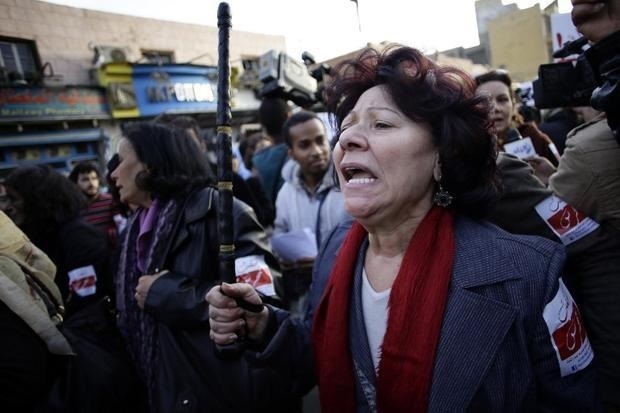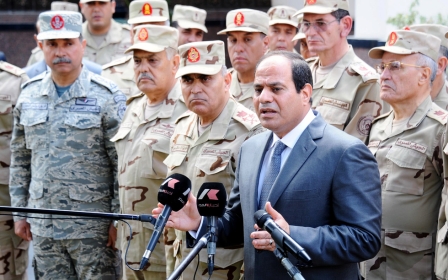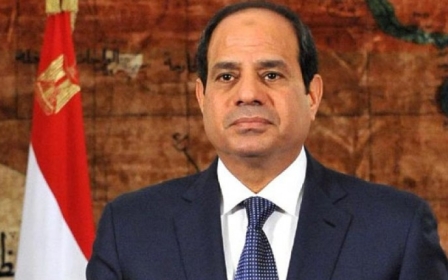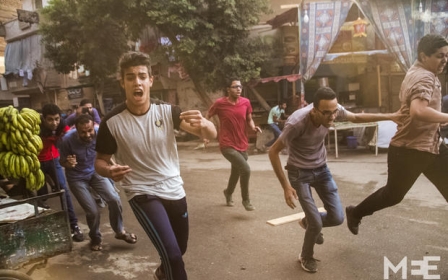Rape to silence: Sexual violence by police rampant in Sisi's Egypt

CAIRO – “It can happen to anyone, they arrest you for any reason, and they do all these things to you. I feel more and more at risk,” said A, speaking from the terrace of a cosy bar in the Egyptian capital. While he was on his way to join his friends, A was checked by the police twice for no apparent reason. "They put pressure on us. All those things you hear about what is going on in police stations and prisons, it terrifies everyone and that way they make us toe the line."
Four years after the 25 January revolution raised the slogans “freedom, justice, dignity,” filling Egyptians with hope for a better life, the population is stifled by a power that human rights organisations consider “worse than that of Mubarak”. Since the army overthrew democratically elected president Mohamed Morsi in July 2013, the Egyptian authorities claim to have arrested more than 16,000 people. NGOs speak of 40,000 political prisoners.
This is the other face of Egypt – one that is far removed from the project of a second Suez Canal or the huge economic conference at Sharm el-Sheikh. This is an Egypt of indiscriminate repression reflected through some horrifying manifestations.
This week, the International Federation for Human Rights (FIDH) published an alarming report on of the systematic use of sexual violence committed by the security forces against citizens. Thirty-two pages depicting the horror that takes place not only in prisons and police stations, but in plain view of everyone, in the street, just outside universities. Such attacks have been described as “systematic," despite the lack of statistics. “Almost with certainty, we can consider that all persons arrested or detained are victims of sexual violence,” said the report. “This is the welcoming gift,” said R, cynically. She works as an analyst at an organisation defending women’s rights.
'I will show you what a man is'
Testimonies collected in the FIDH report are terrifying and reveal the brutality and impunity of the security forces in the country. N tells how she was raped in a police van just outside al-Azhar University.
“I saw the policeman who touched a woman’s breast and told him: 'If you want to arrest her, arrest her, but you do not have the right to touch her like that,'" N told Middle East Eye.
"So he replied: ‘Who do you think you are, a man?’ Then he grabbed me with two other policemen. They hit me, insulted me and took me in their van. They beat me until I could no longer stand up, I lost my veil and they started attacking me. One of the policemen asked them to stop but they asked him to stay quiet.
"One of them said to me: 'I will show you what a man is,' and they laughed. He removed his trousers and sat on my breast, he put his penis in my mouth, once, twice, three times ... I was totally paralysed, I started to vomit. Then he laid down on me. I told him he had no right to do this to me. He hit me on the legs, spread them, and then raped me while insulting me.”
The FIDH report also mentions the suffering of two other young men, raped in a police station in downtown Cairo after a demonstration against military repression.
“An officer asked me a few questions but he did not like my answers,” said one of the two young men. “He asked a young policeman to push his fingers into my anus. He did it, several times.”
There are also all the testimonies reported by relatives or cellmates out of prison: forced sex between inmates, electrocution of genitals, repeated rape and humiliation.
Sisi, worse than Mubarak
The report refers to the impunity plaguing the officers’ ranks, those in black and beige uniforms, especially since Sisi came to power. “Since July 2013, we have noticed a strong increase [in cases],” K, an FIDH member who worked on the survey, told MEE. One of the causes is mathematical: “These last two years, we have witnessed mass arrests, more people arrested and detained; which means an increasing opportunity to commit such abuses.”
An alarming acceleration which, according to humanitarian organisations, is due to the “omnipotence of the security forces” functioning within a state which humanitarian organisations unreservedly describe as a “police state”.
“The police, the military and the intelligence enjoy such freedom that the excesses are tolerated and encouraged by the regime,” the FIDH noted.
“Thugs” in power, are taking their revenge against a people that humiliated them in 2011. “It's a vendetta! Four years ago, people burned police stations. Before the fall of the regime, they especially wanted the fall of the Interior Ministry,” S, a psychiatrist specialising in the care of victims, told MEE.
“Today, the police are retaliating; they wield power and want to remind the people who is in charge,” she added.
But these attacks are not new. They were already widespread under Mubarak, and notable under the transitional government of the Supreme Council of the Armed Forces (SCAF), and now they have returned with the arrival of Sisi.
Amnesty International, present on the ground, also observed this “boom”.
"The very high level of repression involves an underlying violence. Security forces are using force to keep people under control and punish those who dare to go against the authorities. This explains why they mainly use sexual violence,” said N, a member of Middle East Amnesty.
Mad state or deviant policemen?
Nevertheless, many questions arise. To what extent are the authorities guilty of these crimes? Are these acts the result of instructions given by people at the head of the state or are they merely individual violations that are impossible to stop?
"Authorities are responsible on several levels," claimed the FIDH, "starting with their indifference and denial".
But little or nothing has changed since Sisi’s speech in June 2014 in which he called for “moralising Egyptian society” following serious attacks that occurred at Tahrir Square and the creation of a specialised office for the protection of women.
"There has been only one case of civilians convicted of sexual violence, but no state official was ever disturbed about such type of abuses,” a spokesperson for the organistion told MEE.
Last July, Mervet al-Telawi, president of the National Council for Women, said: “It is impossible that a paramilitary organisation - such as the police - could be guilty of such crimes,” thus publicly questioning a young woman’s testimony which subsequently triggered controversy in the press.
However, the accusations go further. “We have no material evidence that these officers receive orders to commit sexual violence, but the similarity of the practices lead us to believe in a generalised pattern as part of a cynical political strategy,” the FIDH said.
This is a suspicion shared by several organisations based in Cairo.
"We know that the police are trained in torture practices," said C, a researcher at an institute specialised in the violations of basic rights.
"I'm not sure they are specifically trained on rape practices, but they are implicitly led to do it in a crude way. The victims' testimonies recount the verbal exchanges among policemen in their presence such as: 'I'll take that one, he has a nice ass; I’ll leave you the girl with the big breasts,'" said S.
Political rape
In addition, there is also the violence committed by the state, perfectly assumed by the authorities that practice the famous “virginity tests,” vaginal and anal examinations in order to officially prove that sexual activity has taken place among those arrested.
Such acts are carried out outside any legal framework, without any justification and specifically targeting the society’s dissenting factions in order to “destroy and humiliate,” said the FIDH. “Those particularly targeted are the political opposition, the Muslim Brotherhood, students and sexual minorities.”
Another concern echoed by witnesses is violence exercised against detainees’ relatives, forcing some prisoners to refuse visits.
“We have testimonials by people telling us they are assaulted when they go to the parlour,” M, president of a youth organisation for the defence of civil and social rights, told MEE.
Such facts were confirmed by A, whose father, accused of being a member of the Muslim Brotherhood group, has been imprisoned for over a year. “Every time we go to the prison, we are physically harassed. Under the pretext that the place is crowded, the police pretend to 'restore order' and, at the same time, lay their hands on everything they can access," A said.
“I already tried to protest but the officer replied: 'He is in charge of your protection, so you can at least allow him to have some pleasure.'"
The more the repression increases and the state’s enemy becomes multiform, the more victims become diversified. Any dissenting voice becomes a rape target.
During discussions, several NGO workers revealed that they, too, have suffered sexual abuse while they are on duty. D, a lawyer, told MEE how she is insulted and herself becomes a victim of sexual harassment when she visits her clients in prison. Another NGO member, renowned for her work with victims of sexual aggression, discretely mentioned having been raped by a group of soldiers.
“For a long time people thought the victims were only the Muslim Brotherhood, who were not believed when they told their stories, since they were considered as personae non gratae in the society. Today, people realise that it affects other segments of the society - activists, lawyers, people with mental disabilities, LGBT people, atheists - anyone with whom authorities have a problem,” said S.
“These are actions committed in order to silence people, and it works,” M said unequivocally.
"If the state, which is supposed to protect our rights, is responsible for such violations. If the state attacks, tortures, rapes not only the population but also those who defend them - this means the citizen is no longer protected,” said S. “People feel insecure."
The silent humiliation
If the fear of reprisals is there, organisations also denounce a scourge, accentuated by the taboo of sexuality within the Egyptian society, which makes denouncing such acts more difficult.
"Civil society does not protect itself against such violence," the psychiatrist S told MEE. "The victims are stigmatised because the prevailing perception suggests that those being targeted are only people of tarnished reputation: homosexuals, liberated women... They do not have the right to either state or people’s justice.
"This silence encourages the spread of such practices. If within society there was a segment against that, if it were more open and said 'we do not care about who is gay, who has an extramarital sexual life,' the issue would probably be less important," the psychiatrist pointed out.
Such conservatism is also used by the perpetrators to blackmail their victims. "The security forces spy on the private lives of all the citizens," S told MEE. "They have access to your Facebook, your calls and text messages, know your friends, your outings and your sex life."
"Egyptians are much more liberated than people say. The biggest fear is that this hidden life comes to be revealed in public. We are not afraid of being killed, we are afraid [about] our family discovering our private life. So what is the strategy? I rape you, and if you denounce me, I will send to your family the sexy photos you have exchanged with your boyfriend."
This is a constant concern that forces people to remain silent and stifle the democratic aspirations of an entire population.
"Today, everything is done to avoid arrest. Within families, we say: 'Oh God, as long as you don't get sent to the police station,' rather than: 'Oh God, hopefully they will not hurt you,' because we know it will happen anyway. They play on our fears."
For security reasons, all the protagonists and organisations that have agreed to testify in this article have been made anonymous.
This article was originally published on Middle East Eye's French page on 25 May 2015.
New MEE newsletter: Jerusalem Dispatch
Sign up to get the latest insights and analysis on Israel-Palestine, alongside Turkey Unpacked and other MEE newsletters
Middle East Eye delivers independent and unrivalled coverage and analysis of the Middle East, North Africa and beyond. To learn more about republishing this content and the associated fees, please fill out this form. More about MEE can be found here.




